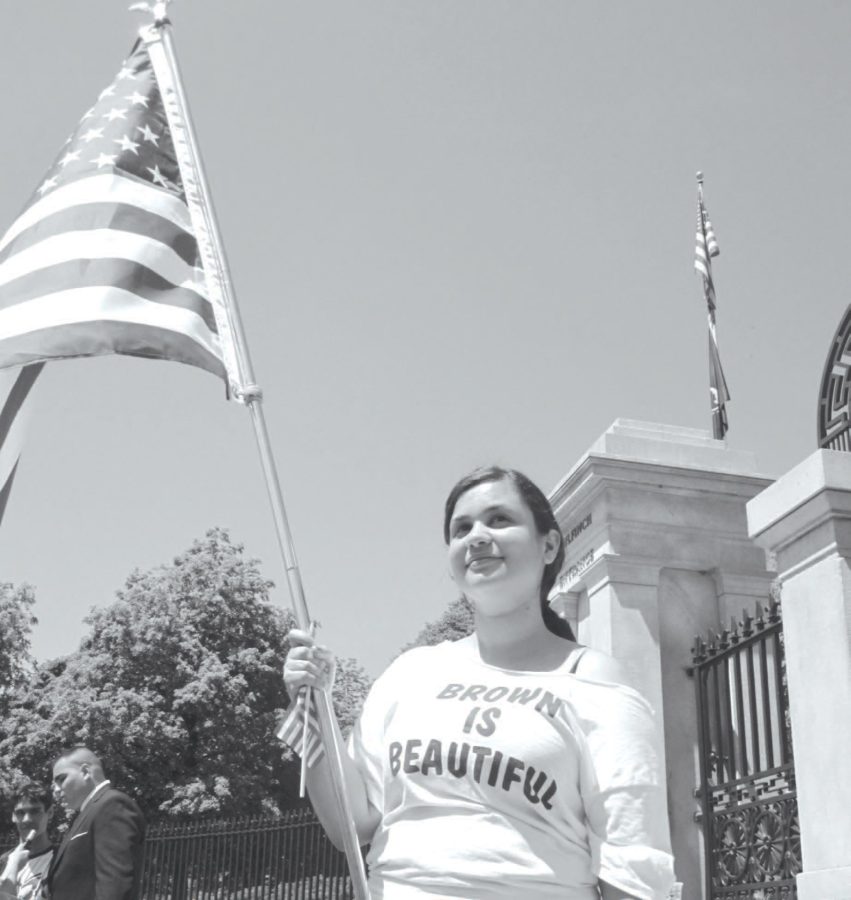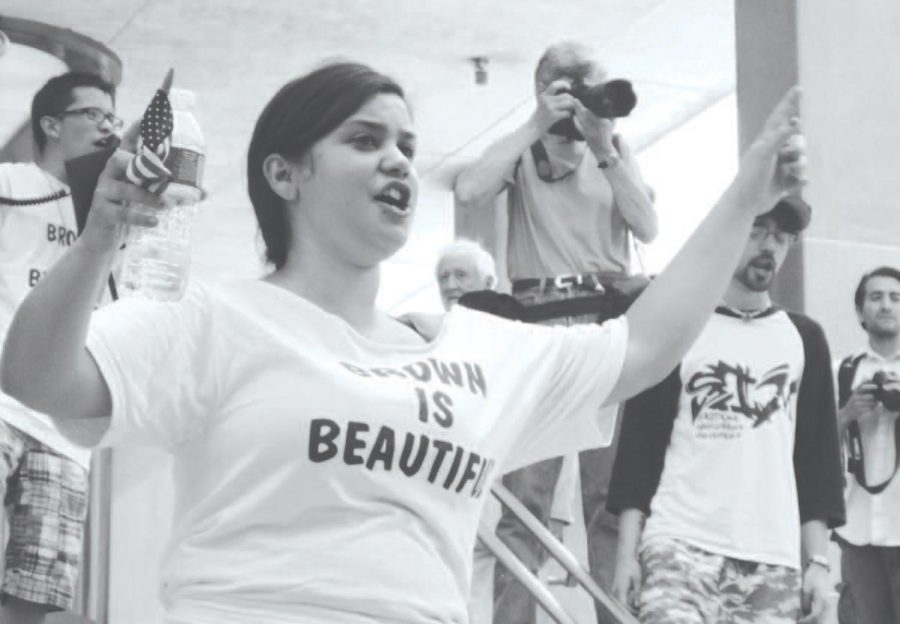In a way, Renata Teodoro has a distinctly American story. She grew up Catholic in the suburbs of Boston. Her parents separat¬ed when she was young. Her mom started a cleaning company. Her father worked too hard to be a part of her life. He left when she was 11, and waited six months to call and tell his family he’d moved to Brazil. He opened an Internet café in Macapa. Now Renata lives with three roommates. She hosts theme parties for her college friends. She likes to bargain shop. She pays for her own apartment, and she used to pay her own tuition at UMass Boston. Now she can’t afford it. Everything she has, she paid for herself. Here’s what makes her particu¬larly American: she’s not native. “I’m a criminal for basically existing, when I had no choice of breaking the law,” Renata said and laughed aloud at the cos¬mic irony of her predicament. “When I was eleven and we were doing the pledge of al¬legiance, I’d debate in my head whether I’m supposed to do it or not just because I’m undocumented, and scared of what’s going to happen to me.” In 1993 Renata walked across the Mexi¬can border with her mother, her brother and her baby sister. Her mother tried to get American visas for the family for months with no success, so she got Mexican visas instead. The plan was to meet Renata’s dad in Minnesota, where he worked as a handy man. He had fled Brazil a year earlier be¬cause he’d been a political activist, and had made homicidal enemies. He fled for his life. Renata with her mother, brother and sister who was still breast-fed, flew on a plane to Mexico and took a bus to Tijuana. From there they walked toward the border and in the desert they met two men, who Renata’s father had paid to guide his family across the border. Immediately after crossing the border, Renata’s brother had to pee. He stopped, and as they waited for him a border patrol truck creeped up on them. One of the men who Renata’s dad had hired grabbed Renata and ran with her out of the clearing and through some trees. It was nighttime. “I think back on that moment,” Renata said, her voice wavering in the silence of a glass meeting room in UMass Boston. “Maybe that was a sign. I don’t know if I’m crazy believing in signs, but I wasn’t meant to be caught. I was there hiding in the grass. My brother my sister and my mom were caught. And my dad was nowhere because he wasn’t with us. And I feel like that was a sign of my life,” she said. “My mom was crying and she was screaming and she was saying that I was lost in the woods, and they couldn’t find me. They tried to find me. I remember hid¬ing and the guy telling me to be quiet and I was sitting there and I was waiting to see if they would find me. And they eventually gave up and they just let her go.” For Renata these memories of crossing the border are episodic, punctuated with trauma. It took several days, as Renata re¬members, to walk from Tijuana into the empty countryside and back around to San Diego. “My mom only brought one orange and we ended up having to split it with the two guys that were with us,” Renata said, then laughed and rested back in her chair. “So we were really thirsty and I remember we were in a shed, or it might have been, I don’t know some kind of shed. My brother found these water jugs, and automatically he just grabbed it. He’s nine years old, and he just starts chugging down what he thinks is wa¬ter, and he hands it to me, and right when I’m about to drink it he starts foaming at the mouth. So my mom had to make him throw up . . . he would kill me for saying this but he ended up having to drink breast milk to dilute the poison. He was getting so sick that he was dehydrated and he was throw¬ing up and he almost died.” From that shed they walked several miles to a hotel in San Diego, where they met Renata’s uncle. They next day they flew to Minnesota. “I remember the first thing I ate in the US,” Renata said. “They gave me a bag of fortune cookies at the hotel.” Her family lived in Duluth for a year be¬fore they moved to Boston. In the late 90s, after repeated attempts to gain citizenship, Renata’s Dad gave up and left the US for good without asking his family to join him or leaving a note. Even though it’s categori¬cally his fault that Renata is in the US now, she says she has stopped obsessing over his role in her predicament. “He wasn’t able to give us what he had promised,” she said, planting her face in a soft stare. “I don’t blame him, but at the same time I’m like, ‘Could you have at least told us you were leaving us, like, given us a warning, left a post-it?'” She laughs about it now, and it’s not a forced laugh. She sees an irony in her strug¬gle for US citizenship, a struggle she didn’t start, a struggle she continues even after her brother’s deportation in 2007, and her mother and sister’s voluntary deportation shortly thereafter. She is the only person in her family left in the US, and she is not will¬ing to give up the friends and connections she has made over the years without putting up a fight. “Just because you’re not talking about it, doesn’t mean you’re safer,” she said. “I learned that the hard way. My family kept it a secret and they ended up getting de¬ported. So me keeping it a secret is not go¬ing to help anybody. It’s not going to change people’s minds.” When Renata thinks of the word immi¬grant she thinks of the dictionary defini¬tion, absent of negative connotations. “I grew up here,” Renata said. “My friends are here. My school’s here. Basically every¬thing that I have, every connection that I have is here. It’s not in Brazil.” Right now the Dream Act is the only hope for Renata, unless a more comprehensive bill passes. “It’s so easy to blame a group of people who can’t even for the most part speak for themselves. They can be detained and de¬ported as soon as they utter the word un¬documented. That could happen,” Renata said. “It’s so easy to abuse that power over somebody who’s undocumented and basi¬cally doesn’t have any rights.” Barely over five feet tall, Renata Teodoro disappears in the protest marches she helps orchestrate carrying a super-sized Ameri¬can flag and her bullhorn. She is one voice in a mass of chants and slogans. Christians tout the Bible. And she’s dedicated her life to converting America. A 22-year-old UMB student when she can afford the out-of-state tuition, she told me that if I want to write about her I have to use the word undocumented. She has a problem with current US law, so precision in language is important to her. “How could I be illegal? What a horrible thing to be,” she said in an interview just a few days after Scott Brown, the Republican dream boat and newest US Senator from Massachusetts, agreed to meet with a mem¬ber of the organization she founded and directs, the Student Immigrant Movement (SIM). “I find it interesting that we always talk about how this country was built on our immigrant ancestors, our fathers, our mothers, but then they add the word illegal . . . I call myself undocumented because it makes me feel less ashamed. That’s what I am. I don’t have documents.” “It’s so easy to blame a group of people who can’t even for the most part speak for themselves. They can be detained and de¬ported as soon as they utter the word un¬documented. That could happen,” she says. “It’s so easy to abuse that power over some¬body who’s undocumented and basically doesn’t have any rights.” Senator Brown publicly opposed giving in state tuition and drivers licenses to undocu¬mented residents of Massachusetts while he was in the state government. And his views on immigration will probably be tested again within the next year, if Democrats have their way in congress. Lately he has been inundated with information about im¬migration reform, and after meeting with a member of SIM Renata said he didn’t know that once an undocumented immigrant’s visa runs out they have no path to citizen¬ship. But he still hasn’t signed on in support of the Dream Act. “I think he’s interested,” Renata said. “I think he wants to do it. What he’s worried about is he doesn’t want to seem like he’s flip flopping.” Lobbying to pass the Dream Act, which includes a provision that would make it easier for states to give undocumented US residents in-state tuition, has become Re¬nata’s soul passion. “It’s just been too long,” she said. “I re¬ally feel the urgency in passing this Dream Act, I think about it nonstop. We’ve been working nonstop. My life is just Dream Act, Dream Act, Dream Act, Dream Act, Dream Act.” And right now, it’s her only hope for US citizenship.
Renata Teodoro Supports The Dream Act






















































